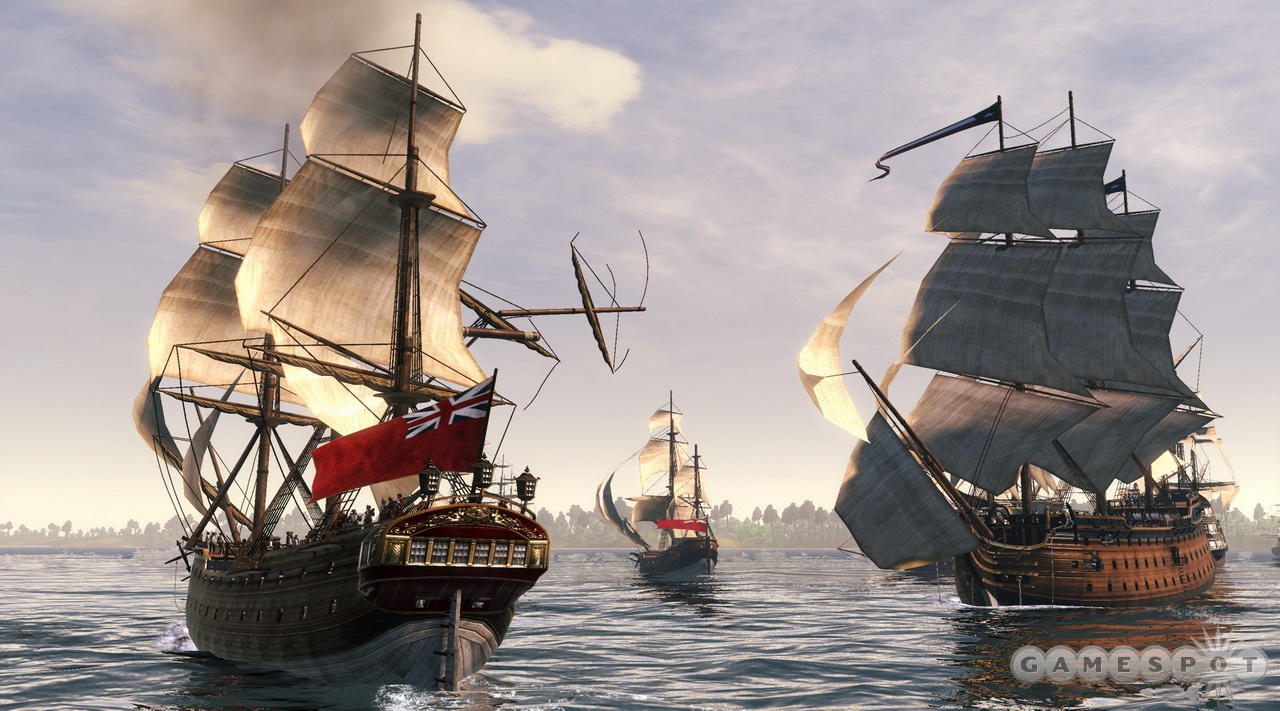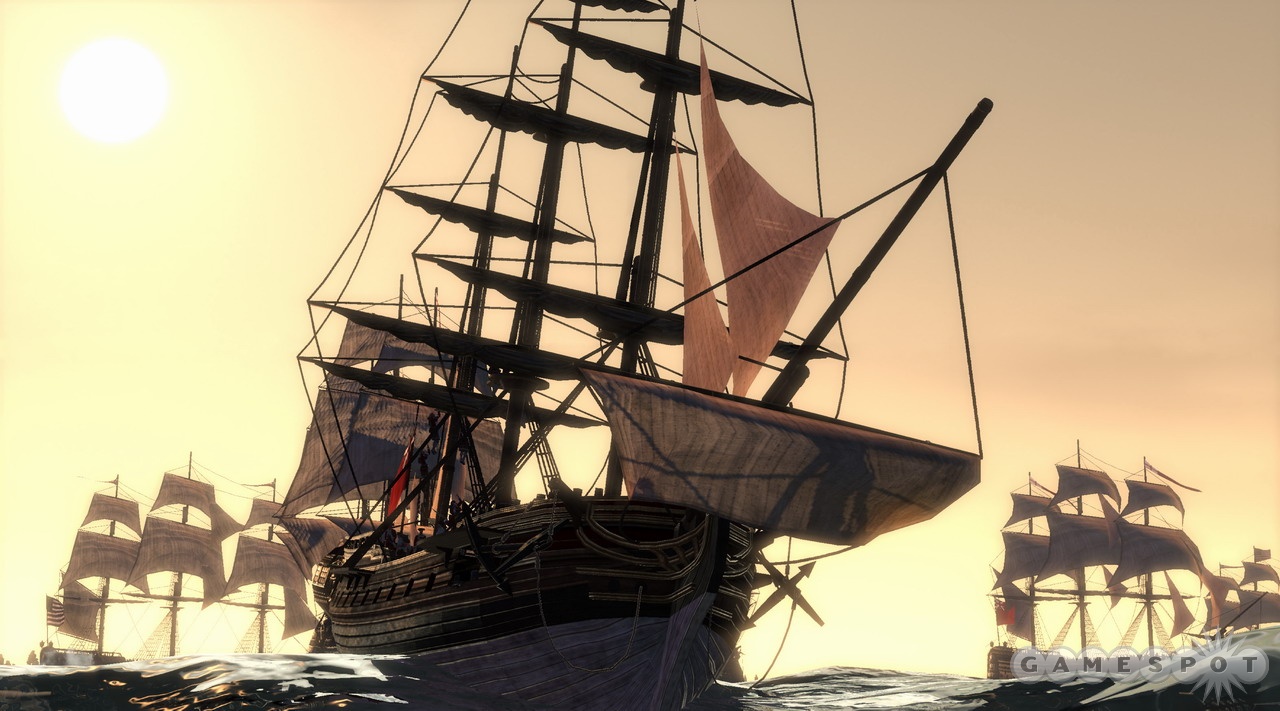Empire: Total War Interview: Streamlined Interface, New Prestige System, and World Domination
We sit down with Creative Assembly to discuss its anticipated strategy game. Prepare for war.
Some strategy games have you focus on building an empire and managing trade and diplomacy with other budding civilizations (before squashing them with your military might). Other strategy games focus on real-time battles where quick management of resources and weaponry will decide your fate. The Total War series from Creative Assembly successfully fuses real-time strategy and empire building, and the upcoming Empire: Total War is its most ambitious project yet. We sat down with Kieran Brigden, Creative Assembly's studio communications manager, for the latest on Empire: Total War. Here's what he had to say.
GameSpot: Empire: Total War is an ambitious game, to say the least. As it spans the dawn of the modern era and much of the globe, we have a number of questions. In previous Total War games, different scenarios had different objectives, and world domination was generally your goal. With so many new options and features in Empire, what are some of the new paths to victory?
Kieran Brigden: Empire features a prestige system, a first for the Total War series. Players will earn prestige as an empire through the growth of their economy, the size and proficiency of their military, the territory they own, and their scientific advancements and achievements. Any combination of these elements can give a player a high score, meaning there are a huge variety of ways to win the game.
GS: What are the specialties of the various playable factions, and how will they complement players with different playing styles? Which factions will favor the aggressive players, and how? Which factions will favor the defensive players who prefer to develop their economies and political ties, and how?
KB: The beauty of Empire is that although certain factions start in specific positions and with advantages and disadvantages, everything from there is the player's choice. Should you choose to become a land superpower and invest all your research and development into advancing your land technologies and creating invincible armies, you can do so. If you want to be a massive seafaring nation, you can pursue this road. If you wish to be a peaceable nation, expanding through negotiations or growing your economy with trade, the choice is yours. That diversity and balance is key to Empire's new experience.
GS: The Total War franchise is known for having a tremendous number of options and things to do. With the addition of firearms and naval combat, things seem like they can only become more complicated. How is the game being streamlined to make managing an empire, well, manageable for a new player?
KB: One of Empire's key targets is to be more accessible than previous Total War titles. The addition of firearms and naval combat has been handled to make them as accessible as possible both to new players and established fans. We've done this by keeping the UI common across the three elements of the game, campaign, land combat, and naval combat. In addition, all the underlying TW interface tactics are the same across the combat system. You can still click and drag units into formation, left-click select, box select, and select by unit card. It's designed so that what a player feels should happen intuitively, i.e. dragging a unit out across the field changes their formation, does happen.
When it comes to the grand campaign mode we've also reduced the amount of micromanagement, or to put it simply, there's less clicking and fiddling to do. A good example of this is recruiting units centrally from a general. Rather than raising little armies in all your towns and then walking them around the map to meet up, you can now just order them all from a general and have the men built locally and assemble around him.

GS: Tell us about the progression that players will see in their naval battles. Sure, in the beginning, we may only have a handful of sloops to bring into battle, but after dozens of turns and lots of development, players will eventually have huge fleets featuring ships of the line with row after row of cannon. Just how big will naval battles eventually get, and how will players manage such huge fleets?
KB: The issue of management feeds into the answer on accessibility. We want Empire to represent a wealth of tactics and strategies but also be immediately playable. Getting this balance is something TW games have traditionally done very well with land engagements, so we sought to extend that principle to the naval combat. You can simply click and select your ships, group them, and move them across the battlefield, using preset formations or creating your own, all using the mouse. Using their special ammunition types, boarding and other unique orders are selected from the bottom right, as with land combat. Players can literally use the mouse to drag ships into position and arrange arcs of fire for maximum effect, making the battles huge in scale but easily manageable. Obviously, the better the budding admiral gets the more they may want to fiddle and tweak, and the system lets you do that to your heart's content.
In terms of the sheer size and scale of the naval battles, we're currently looking at having up to 20 vessels per side, with massive 120-gun first-rate ships of the line riding the crests of huge waves to blast cannon fire into one another at zero range whilst lighter, smaller ships speed between lines of fire, wreaking havoc on enemy masts and crew. Also, don't forget many naval engagements didn't only feature two nations, you'd often have three or four navies turning up to a fight... I'll leave the rest to your imagination!
GS: What would you say naval combat adds to the game in a larger sense? Was there concern from fans that the series' traditional land battles, while impressively huge, weren't as exciting as they first seemed back in the Shogun: Total War days? And how important will developing a strong navy be in the larger sense of trying to conquer the known world? How viable will it be to focus entirely on developing large, landlocked forces? Conversely, how viable a strategy will it be to skimp on ground forces and focus on building up a huge navy?

KB: That's not one question, it's five! Taking each in turn, naval combat is a very integral addition to the gameplay in Empire. With the time period we've chosen, the naval arms race and the exploration and militarization of the world's oceans was immensely important. To truly develop your nation in Empire you'll need to secure trade routes, enter naval trade theatres for a slice of their lucrative booty, and ferry armies across the globe. All of these actions bring you into conflict with other empires. If you want to protect your troops in transit, import the riches of the Indies, secure trade routes from the new world, and generate regular income or defend your own shores and ports, you'll need a capable naval force. The 18th century created war on a truly global scale; conflicts in Europe were fought in the Atlantic and beyond. We want to create that same scale and scope with Empire.
The move from melee battle to ranged warfare was naturally a worry for some of our fans. However, we've kept the same mechanics and brutal, swift, tactical combat that's the hallmark of the TW series. It's a different kind of awesome when you watch a line of troops ready their rifles, take aim, and unleash a devastating barrage of fire as an enemy charges toward them. And don't forget, the age of the musket was also the age of the bayonet. Melee combat is still crucial--the gentry carried swords and horseback riders did, too--but committing those forces is a much more critical decision this time around.
Every player will choose a different path depending on their priorities and their overall action plan. Sure, if you're a landlocked nation you may want to create a massive standing army and walk across your continent. Conversely, you may want to race for a port and secure it before producing a massive navy. The player's actions are affected by their starting conditions and the actions of the other empires, but again, one of the cool features of TW is letting players go, "What if?" What if instead of an amazing navy, Britain had an invincible land army? What if France focused entirely on their naval technologies and expanded into the world that way? Whatever your strategy as a player, you can realize it in Empire.
GS: Speaking of which, tell us about how land battles are being enhanced. The addition of gunpowder and muskets in the hands of foot soldiers must change the face of land battles radically.
KB: Ranged warfare was a massive tactical change for the era and is of course a new set of tactics for budding generals. We've faithfully reproduced everything you'd expect of this ranged warfare period; misfires, degrees of accuracy, cover systems, garrisoning, arcs of fire, and effective range are all playing their part beneath the surface. All of this detail isn't thrust at the user; much like the wind system in the naval battles, it's just intuitive. If my guys hide behind this wall, out of range of the enemy, they'll be ok; if they stand out in the open and march up hills into oncoming fire, they won't.
The movement and positioning of troops is key to a player's victories now--it's no longer just a matter of knowing when to commit. That said, brutal melee combat is still a key feature and is another choice players must make.
GS: What famous historical battles will be included in separate scenarios?
KB: We're still looking at this and developing our ideas as to what we include and how we do it.

GS: Finally, how will famous leaders like George Washington and Napoleon play into Empire: Total War?
KB: Many famous individuals of the time are represented, either as generals, gentlemen, admirals, or even politicians. These figures each have unique traits and certain preferred tactics. What faction they're born into and how well they progress is, naturally, up to you...
GS: Thanks for the time.
KB: No worries, thanks for being interested in Empire!
Got a news tip or want to contact us directly? Email news@gamespot.com

Join the conversation